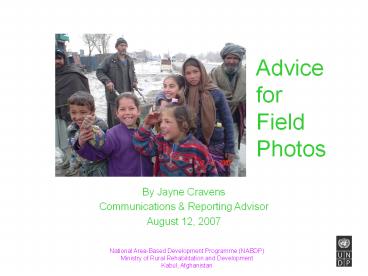National Area-Based Development Programme (NABDP) - PowerPoint PPT Presentation
Title:
National Area-Based Development Programme (NABDP)
Description:
National Area-Based Development Programme (NABDP) ... Many of the best NABDP photos also available at www.flickr.com/photos/nabdp ... – PowerPoint PPT presentation
Number of Views:81
Avg rating:3.0/5.0
Title: National Area-Based Development Programme (NABDP)
1
Advice for Field Photos
- By Jayne Cravens
- Communications Reporting Advisor
- August 12, 2007
2
Firstly THANK YOU for sharing your photos
already!
3
Every Picture Tells A Story
4
What Does This Photo Say?
5
What Does This Photo Say?
6
What Does This Photo Say?
7
What Does This Photo Say?
8
What Does This Photo Say?
9
What Does This Photo Say
10
The best photos dont completely rely on text to
explain them in order for you to hear at
least part of the overall story.
11
NABDP needs photos for many different reasons,
to serve many different audiences
12
I urgently need photos
- of children using a water pump
- of men working
- of that workshop in Herat last year
- of NABDP staff in action
- of the Belgians on a field visit
- of women in discussion
- with lots of color
- of smiling faces
- of the Japanese donors signing our latest
agreement
13
Who Are Photos For?
- Others?
- Donors
- Media/Press
- Citizens of Afghanistan
- Government
- Internal MRRD / NABDP / UNDP Staff
- Partner Organizations
- Other Organizations
- International General Public
14
Why Do They Want Photos?
- To show progress on projects they are funding
- Proof of work
- To put images with the text they read in reports
- Other reasons?
- Donors
15
Why Do They Want Photos?
- To use in their publications
- To use in reports, publications, web site, etc.
- To demonstrate progress/action
- Media / Press
- Government
16
Tips for Field Trip Photos
- Be respectful ask for permission notify the
group that photos will be taken and how they will
be used. - Take LOTS of photos. When in doubt (is this a
good photo?), take the photo. Take several
photos of the same scene, from the same angle and
different angles. - Outside shots are best (because of light), but
take pictures away from the sun, if possible. - When inside, get close to the subject, and try to
aim away (instead of into) light sources. - Get FACES and ACTION when possible.
- Get C O L O R when possible.
- Show local people talking, teaching, learning,
working, etc. - As much as local culture and circumstances allow,
get photos of women. - Its okay to arrange people for a photo (e.g.
asking people to stand in a certain place). - Remember that photos will serve many needs
(donors, government, internal use, etc.).
17
Special Consideration for Indoor
Workshops/Indoor Ceremonies
- Get CLOSE to the main subject(s), and try to aim
away (instead of into) light sources. - Get FACES, with EXPRESSION if possible.
- Ask signers of an agreement to pose together
(stand close together with the agreement, have
them shake hands and face the camera, etc.) after
signing for a photos.
18
Dont wait for the perfect shot!Take lots of
photos, and the right photo will show up
when you review the pictures later.
19
Photo Advice in Action
Bored? Not participating? Not included? No
expression.
Participating. Thoughtful. Included.
20
Photo Advice in Action
Who? Too dark. No faces
Participating. Thoughtful. Included. Better
photo even though it is out-of-focus
21
Labeling Is Key
- Make sure your cameras date is set correctly (so
we know when the photo was taken the date does
not have to appear on the photo, however) - When you download photos onto your computer, put
them in a folder with a very descriptive name
(location and project name are key). - Adding a narrative in a MS Word document and
putting it in your photo folder is GREATLY
appreciated (for instance, noting why a photo is
important if it wont be obvious when others view
the photo) - If there are donors/VIPs, etc. in the photo,
please provide proper IDs
22
Please Share!
- Please share field and event photos with
communications unit promptly! - Videos are welcomed too! (same rules apply good
light, faces, etc.) - We have a 300 file of the very best photos and
can burn these onto a CD for you! - Many of the best NABDP photos also available at
www.flickr.com/photos/nabdp/
23
Most Important Things to Keep in Mind (1)
Take lots of photos(2) Share them with
communications unit (Jayne, Gunda or Fariba) via
a memory stick (never via email!)
THANK YOU http//www.mrrd.gov.af/nabdp/































